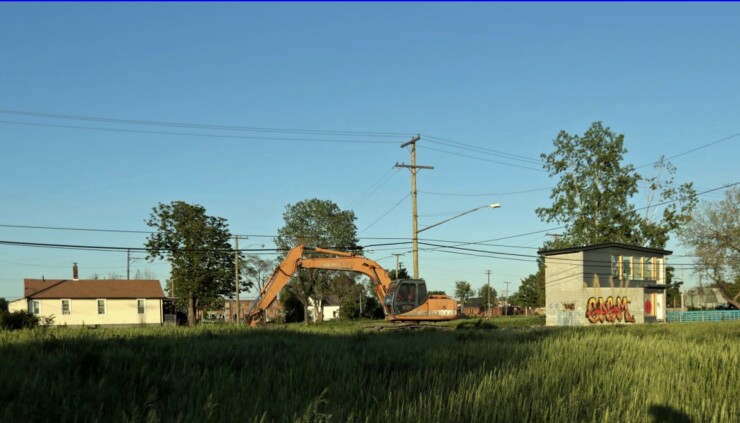Detroit chose BofA Securities and Siebert Williams Shank & Co. LLC to lead its $175 million voter-authorized, blight bond sale expected early next year, city finance officials said.
The underwriters — with BofA running the books — were chosen after a recent request for proposals process. Selection of the team and the expected release of the city’s latest comprehensive annual financial report in the coming days will lay the groundwork for further work on the sale of the city’s high-yield paper.
The financing, expected as soon as late January, would mark Detroit's third general obligation-backed, stand-alone issue since it emerged from Chapter 9 bankruptcy in late 2014 after shedding $7 billion of debt.

“As the new calendar year starts we plan to obtain ratings updates from Moody's Investors Service and S&P on a $175 million offering to take place early in the first quarter of 2021,” John Naglick Jr., chief deputy chief financial officer and finance director said in an email.
The city has won a series of upgrades since emerging from Chapter 9 but its ratings remain firmly in speculative grade.
Ahead of a fall deal, Moody’s Investors Service affirmed the city’s Ba3 rating and positive outlook while S&P Global Ratings affirmed the city’s BB-minus rating and negative outlook. "The negative outlook on the BB-minus rating reflects the unprecedented fiscal and economic pressure stemming from the COVID-19 pandemic and ensuing recession," said S&P analyst John Sauter.
The COVID-19 pandemic’s impact on the city’s gambling and other revenues will draw investor scrutiny.
“The marketing outreach will occur through the co-senior managers Bank of America Securities and Siebert Williams Shank as coordinated through the city's financial advisor — Public Resources Advisory Group,” Naglick said. Miller Canfield Plc will be bond counsel and Dickinson Wright Pllc is underwriter’s counsel.
Voters authorized Mayor Mike Duggan's
The city would save 8,000 homes and demolish another 8,000 over five years with the bond proceeds. The plan calls for unlimited tax general obligation borrowing with 64% sold as tax-exempt and the other 36% as taxable to maintain flexibility in what the city eventually does with the rehabilitated properties.
The city has demolished 21,000 vacant and uninhabitable homes since 2014 and saved another 8,000, with 22,000 vacant houses still remaining that need to be addressed, including 14,000 in need of demolition.
No tax increases are required as the current millage, which absent voter approval would have gone down, supports the borrowing.
Unsecured bondholders and insurers saw recoveries of just 41 cents on the dollar for some and 74 cents for others in the bankruptcy, but the city has easily found buyers for its last two rounds of unenhanced borrowing at steep spread penalties.
The city sold
The buyers included repeat purchasers from the city’s
S&P cut its Detroit outlook to negative in April due to the growing revenue wounds from the COVID-19 pandemic and strains they pose to the city’s ability to keep the books balanced — a status needed to prevent a move back to state fiscal oversight. The city has cut spending and used some reserves.
The Detroit Financial Review Commission retains some limited post-bankruptcy oversight of city finances but if the city doesn’t maintain balanced operations it could return to more stringent management for three years.
Post-pandemic, pensions remain the city’s most pressing strain. The city's 2014 plan of adjustment gave the city breathing room with help from the state and private entities until 2024 when an estimated $170 million payment is owed. The city has built up $185 million in a Retiree Protection Fund to offset the impact on the operating budget and it’s expected to reach $355 million by 2024.
High-yield paper is in demand in the current market and if that holds into the New Year, Detroit will benefit.
“Any incremental yield draws attention,” said Richard Ciccarone, president of Merritt Research Services. “There are investors who will stay away because of Detroit’s fundamental weaknesses but some buyers will be more lenient.”
Ciccarone said the city could also benefit from political and other momentum afoot from an incoming Democratic administration in Washington, D.C. that is viewed as more friendly to cities, and President-elect Joe Biden’s choice of former Michigan Gov. Jennifer Granholm to lead the Energy Department as well as the announcement that as part of their merger Detroit-based TCF Financial Corp. and Columbus, Ohio-based Huntington Bancshares Inc. will retain dual headquarters.
Ciccarone said he expects the CAFR will see receive deep investor scrutiny and while investors might view blight removal as beneficial to the city’s overall economic health they will likely dig into the details of the plan.





